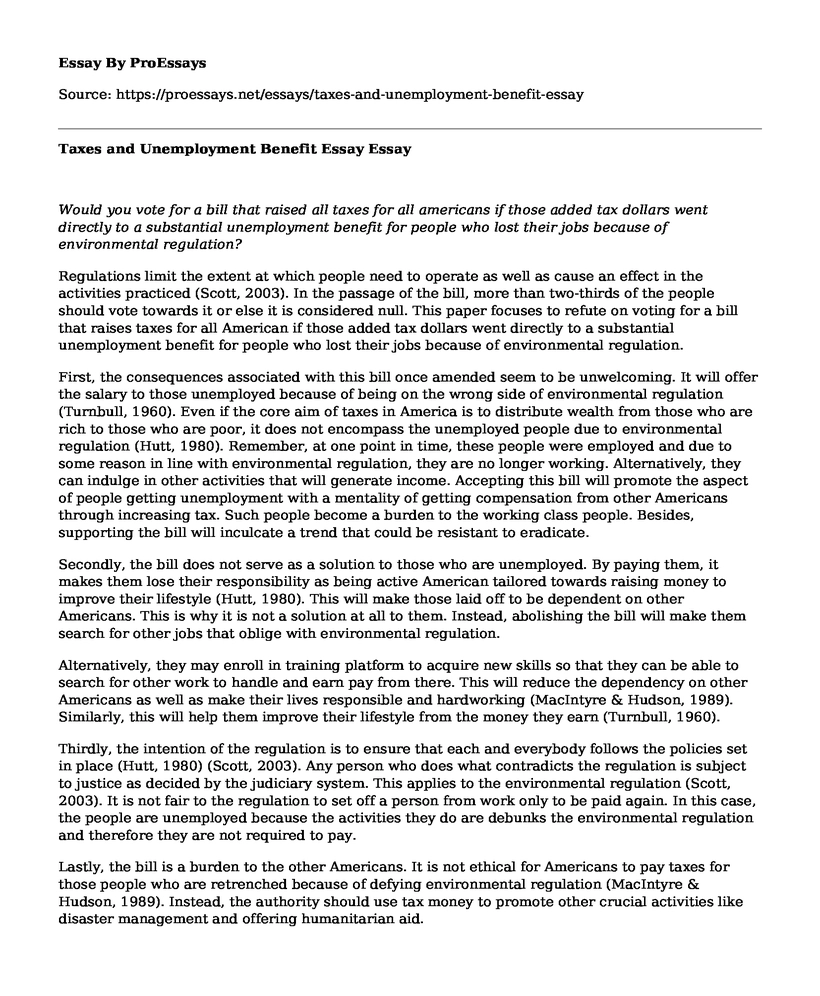Would you vote for a bill that raised all taxes for all americans if those added tax dollars went directly to a substantial unemployment benefit for people who lost their jobs because of environmental regulation?
Regulations limit the extent at which people need to operate as well as cause an effect in the activities practiced (Scott, 2003). In the passage of the bill, more than two-thirds of the people should vote towards it or else it is considered null. This paper focuses to refute on voting for a bill that raises taxes for all American if those added tax dollars went directly to a substantial unemployment benefit for people who lost their jobs because of environmental regulation.First, the consequences associated with this bill once amended seem to be unwelcoming. It will offer the salary to those unemployed because of being on the wrong side of environmental regulation (Turnbull, 1960). Even if the core aim of taxes in America is to distribute wealth from those who are rich to those who are poor, it does not encompass the unemployed people due to environmental regulation (Hutt, 1980). Remember, at one point in time, these people were employed and due to some reason in line with environmental regulation, they are no longer working. Alternatively, they can indulge in other activities that will generate income. Accepting this bill will promote the aspect of people getting unemployment with a mentality of getting compensation from other Americans through increasing tax. Such people become a burden to the working class people. Besides, supporting the bill will inculcate a trend that could be resistant to eradicate.
Secondly, the bill does not serve as a solution to those who are unemployed. By paying them, it makes them lose their responsibility as being active American tailored towards raising money to improve their lifestyle (Hutt, 1980). This will make those laid off to be dependent on other Americans. This is why it is not a solution at all to them. Instead, abolishing the bill will make them search for other jobs that oblige with environmental regulation.
Alternatively, they may enroll in training platform to acquire new skills so that they can be able to search for other work to handle and earn pay from there. This will reduce the dependency on other Americans as well as make their lives responsible and hardworking (MacIntyre & Hudson, 1989). Similarly, this will help them improve their lifestyle from the money they earn (Turnbull, 1960).
Thirdly, the intention of the regulation is to ensure that each and everybody follows the policies set in place (Hutt, 1980) (Scott, 2003). Any person who does what contradicts the regulation is subject to justice as decided by the judiciary system. This applies to the environmental regulation (Scott, 2003). It is not fair to the regulation to set off a person from work only to be paid again. In this case, the people are unemployed because the activities they do are debunks the environmental regulation and therefore they are not required to pay.
Lastly, the bill is a burden to the other Americans. It is not ethical for Americans to pay taxes for those people who are retrenched because of defying environmental regulation (MacIntyre & Hudson, 1989). Instead, the authority should use tax money to promote other crucial activities like disaster management and offering humanitarian aid.Conclusion
In conclusion, the bill does not provide a permanent solution because it does not prove the basis of its legitimacy since it aims at straining the other Americans who are working to improve their lives (Scott, 2003). It is also associated with the formation of a trend of people becoming unemployed on the same basis so that they are paid free money. It is therefore clear that the bill is not helpful hence should be voted against.
References
Hutt, P. (1980). Five Moral Imperatives of Government Regulation. The Hastings Center Report, 10(1), 29.
Turnbull, R. (1960). Imperatives, Logic, and Moral Obligation. Philosophy Of Science, 27(4), 374-390.
Scott, C. (2003). Regulation. Aldershot, Hants, England: Ashgate/Dartmouth.
MacIntyre, A., & Hudson, S. (1989). Human Character and Morality. Nous, 23(3), 389.
Cite this page
Taxes and Unemployment Benefit Essay. (2022, Feb 21). Retrieved from https://proessays.net/essays/taxes-and-unemployment-benefit-essay
If you are the original author of this essay and no longer wish to have it published on the ProEssays website, please click below to request its removal:
- Government Spending and Taxes - Essay Example
- Reflection Essay on Youth Unemployment
- Paper Example on Managing Liquidity Risk in the Banking Industry
- Case Analysis Essay on San Antonio ISD v. Rodriguez: Funding & Taxation Inequality
- Personal Bank Accounts: A Guide to Secure Savings & Asset Management - Essay Sample
- Unions in America: An Evolutionary Journey - Essay Sample
- Essay Example on Employees Struggle to Balance Work and Personal Life







